外研版(2019) 必修第一册 Unit 1 A New Start Using language课件 (48张)
文档属性
| 名称 | 外研版(2019) 必修第一册 Unit 1 A New Start Using language课件 (48张) | 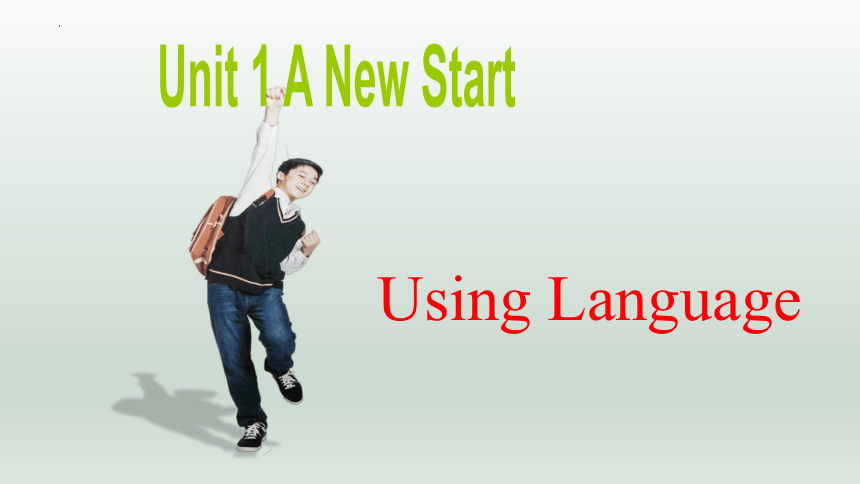 | |
| 格式 | zip | ||
| 文件大小 | 2.8MB | ||
| 资源类型 | 教案 | ||
| 版本资源 | 外研版(2019) | ||
| 科目 | 英语 | ||
| 更新时间 | 2022-09-01 22:04:19 | ||
图片预览

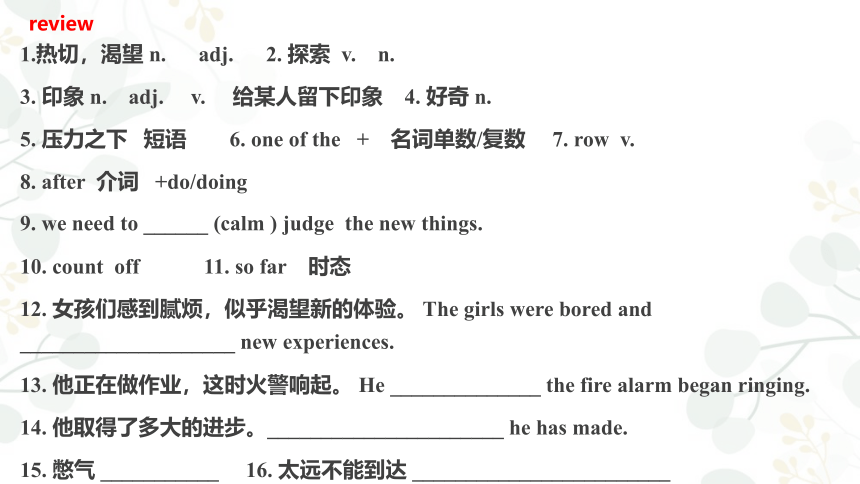
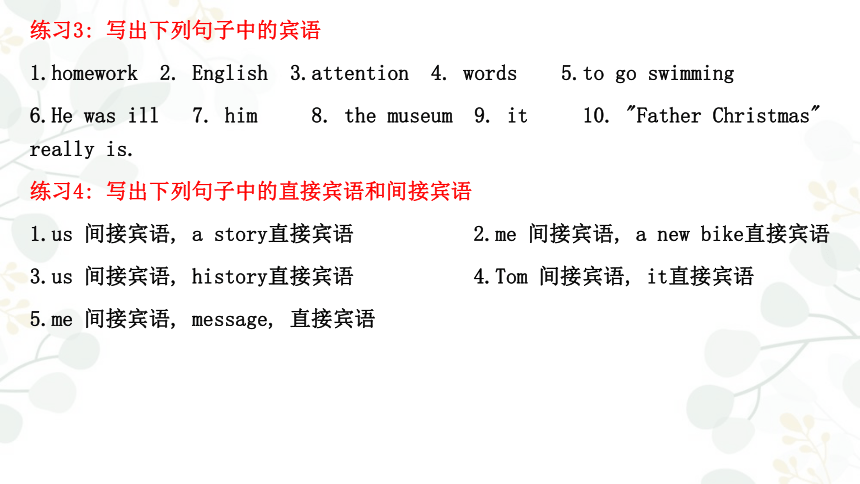
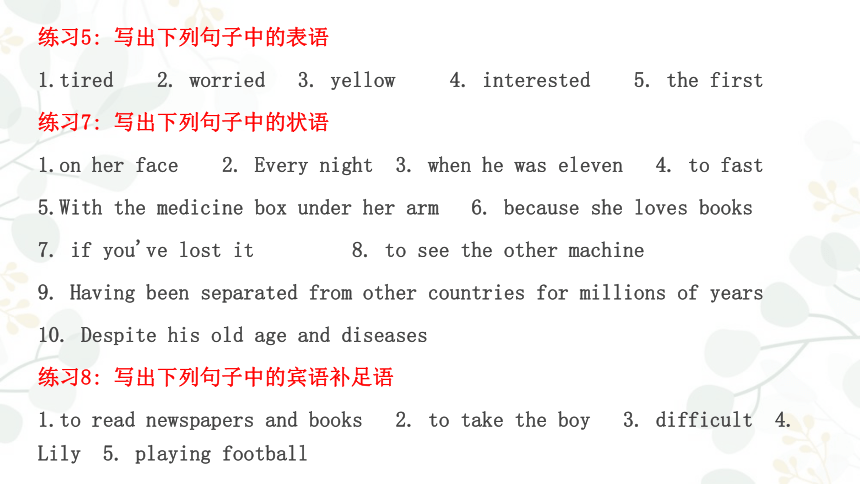
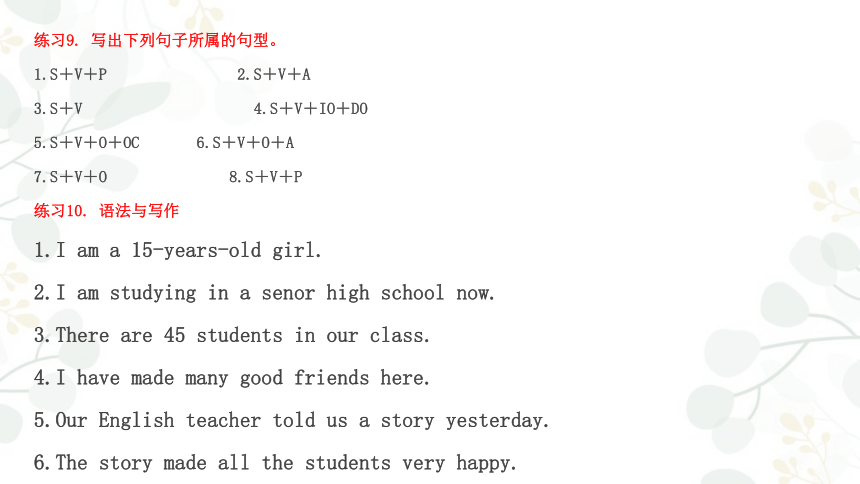
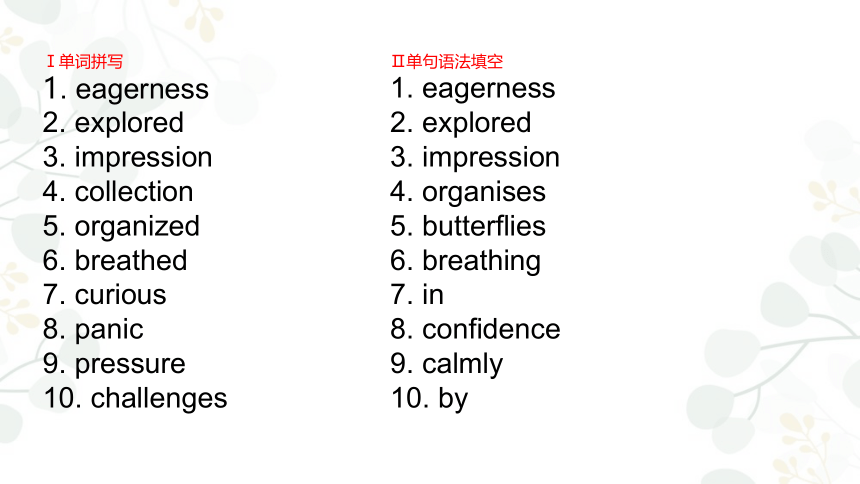

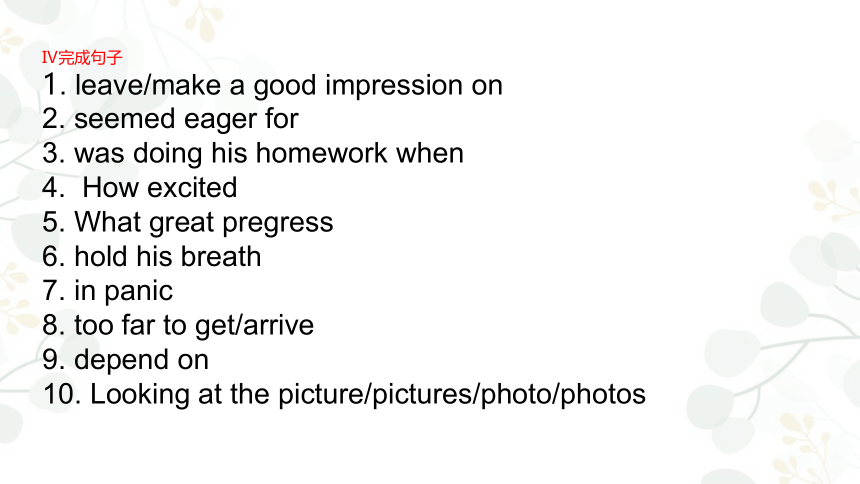
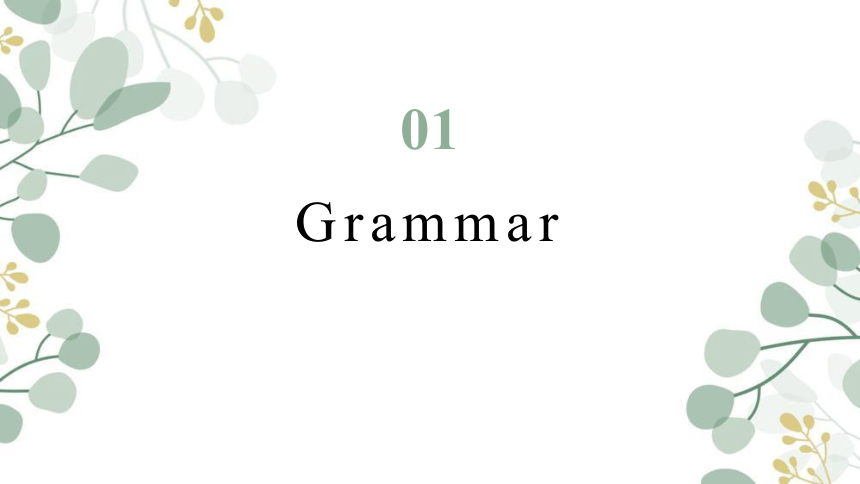
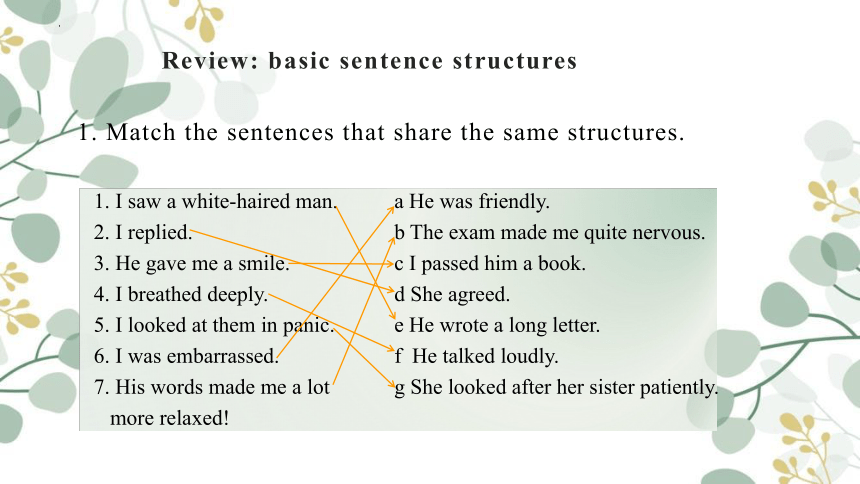
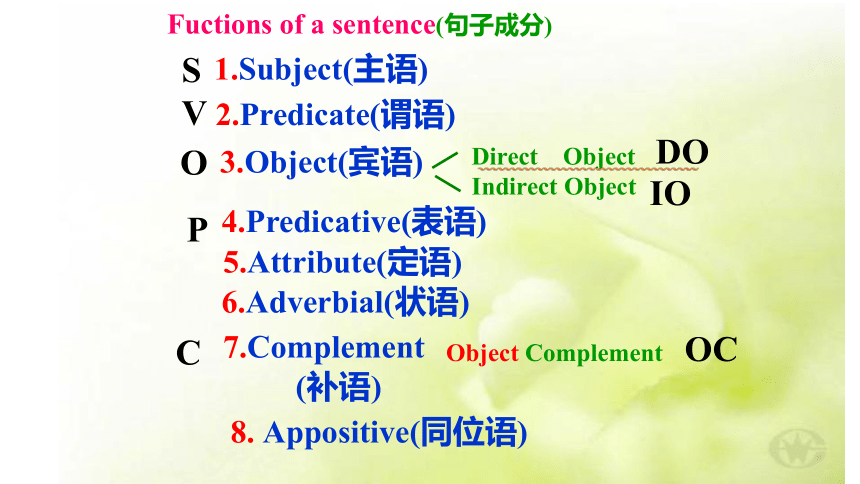

文档简介
(共48张PPT)
Unit 1 A New Start
Using Language
review
1.热切,渴望 n. adj. 2. 探索 v. n.
3. 印象 n. adj. v. 给某人留下印象 4. 好奇 n.
5. 压力之下 短语 6. one of the + 名词单数/复数 7. row v.
8. after 介词 +do/doing
9. we need to ______ (calm ) judge the new things.
10. count off 11. so far 时态
12. 女孩们感到腻烦,似乎渴望新的体验。 The girls were bored and ____________________ new experiences.
13. 他正在做作业,这时火警响起。 He ______________ the fire alarm began ringing.
14. 他取得了多大的进步。______________________ he has made.
15. 憋气 ___________ 16. 太远不能到达 ________________________
练习3: 写出下列句子中的宾语
1.homework 2. English 3.attention 4. words 5.to go swimming
6.He was ill 7. him 8. the museum 9. it 10. "Father Christmas" really is.
练习4: 写出下列句子中的直接宾语和间接宾语
1.us 间接宾语, a story直接宾语 2.me 间接宾语, a new bike直接宾语
3.us 间接宾语, history直接宾语 4.Tom 间接宾语, it直接宾语
5.me 间接宾语, message, 直接宾语
练习5: 写出下列句子中的表语
1.tired 2. worried 3. yellow 4. interested 5. the first
练习7: 写出下列句子中的状语
1.on her face 2. Every night 3. when he was eleven 4. to fast
5.With the medicine box under her arm 6. because she loves books
7. if you've lost it 8. to see the other machine
9. Having been separated from other countries for millions of years
10. Despite his old age and diseases
练习8: 写出下列句子中的宾语补足语
1.to read newspapers and books 2. to take the boy 3. difficult 4. Lily 5. playing football
练习9. 写出下列句子所属的句型。
1.S+V+P 2.S+V+A
3.S+V 4.S+V+IO+DO
5.S+V+O+OC 6.S+V+O+A
7.S+V+O 8.S+V+P
练习10. 语法与写作
1.I am a 15-years-old girl.
2.I am studying in a senor high school now.
3.There are 45 students in our class.
4.I have made many good friends here.
5.Our English teacher told us a story yesterday.
6.The story made all the students very happy.
Ⅰ单词拼写
1. eagerness 2. explored
3. impression 4. collection
5. organized
6. breathed
7. curious 8. panic
9. pressure
10. challenges
Ⅱ单句语法填空
1. eagerness
2. explored
3. impression
4. organises
5. butterflies
6. breathing
7. in
8. confidence
9. calmly
10. by
Ⅲ适当形式填空
1. woke up
2. one by one
3. has been introduced to
4. butterflies in his stomach
5. over and over again
6. pay attention
7. sharing with
8. depend on
9. each other
10. in panic
Ⅳ完成句子
1. leave/make a good impression on
2. seemed eager for
3. was doing his homework when
4. How excited
5. What great pregress
6. hold his breath
7. in panic
8. too far to get/arrive
9. depend on
10. Looking at the picture/pictures/photo/photos
Grammar
01
1. Match the sentences that share the same structures.
Review: basic sentence structures
1. I saw a white-haired man.
2. I replied.
3. He gave me a smile.
4. I breathed deeply.
5. I looked at them in panic.
6. I was embarrassed.
7. His words made me a lot
more relaxed!
a He was friendly.
b The exam made me quite nervous.
c I passed him a book.
d She agreed.
e He wrote a long letter.
f He talked loudly.
g She looked after her sister patiently.
Fuctions of a sentence(句子成分)
1.Subject(主语)
3.Object(宾语)
2.Predicate(谓语)
4.Predicative(表语)
5.Attribute(定语)
6.Adverbial(状语)
7.Complement
(补语)
Direct Object
Indirect Object
Object Complement
S
V
O
P
DO
IO
C
OC
8. Appositive(同位语)
His bike was stolen.
2. Everything is ready.
3. Experiencing two wars is
terrible for him.
4. To see is to believe.
5. What I mean is to work harder.
6. Whether they would support us
was a problem.
7.That you didn’t go to the speech
was a regret.
Subject(主语)
主语:表示句子所要说明或描述的人或事物,一般由名词、代词、
动名词、____________或句子充当,通常置于句首。
to do不定式
Predicate(谓语)
Jim left just now.
2. We do our homework every night.
3. Each of us has been given a gift.
4. Who will take over the company
5. Will you look after my dog
6. Turn up the radio!
谓语: 说明或描述主语的动作、状态或特征,
由动词或动词短语充当,位于主语之后。
它有 、________等的变化,
并受主语人称和数的影响。可以有自己的状语,
及物动词须有自己的宾语。
时态
语态
1.Is he still a teacher
2.The professor appeared happy.
3. Are they behind the door
4.The man looked surprised.
5.His job is looking after the patients
in a hospital.
6.This is what he said just now.
Predicative(表语)
表语在连系动词后面,表明主语的身份、内容或性质、特点、状态。表语可以由名词、动词不定式、动名词、表语从句;形容词、分词、介词短语、副词等充当。
1. Did you see the elephant
2. Do you like it
3. He enjoys reading.
4. I’d like to go surfing.
5.He asked me what I was
thinking about.
6.Mr Wang said that we should
show respect for him.
7.He asked me when I would go there.
8.She made it clear that she had
nothing to do with it.
Object(宾语)
宾语是动词的对象或承受者。宾语可由名词、代词、动词不定式、动名词、宾语从句等充当。
Object Complement(宾补)
1.I never heard him sing.
2.We saw some boys swimming in a lake.
3. I find him interesting.
4. We made him monitor of our class.
5. John asked me to help him.
6. He found himself in hospital.
7. I saw him off at the airport yesterday.
< >
< >
< >
< >
宾语补足语在宾语后面,补充说明宾语的身份内容或性质、特点、状态。宾语补足语也可说明宾语(被)做或不(被)做什么。宾语补足语可以由名词、形容词、介词短语、副词、动词不定式、分词等充当。
< >
< >
< >
1.It’s a touching story.
2.Who is the woman being operated on
3.Are you fond of the girl who is very clever
4.I’ll never forget the days that we spent together.
5. The black bike is mine.
6. I have 5 books.
7. A sleeping boy is sleeping.
8. They made paper flowers.
9. The boy in the room is Jack
Attribute(定语)
( )
( )
( )
( )
定语用来修饰名词或代词,可由形容词,代词,数词,名词,介词短语,不定式,动名词,分词,从句等充当。
( )
( )
( )
( )
( )
Adverbial(状语)
状语主要修饰动词,也可以修饰形容词或副词,甚至修饰整个句子,它可以表示动作或状态发生的时间,地点,条件,原因,目的,结果,方式,程度,频率、伴随、让步和比较等。一般由副词,介词短语,不定式,分词或相当于副词的词或短语或从句充当。
1.She’s lying in bed reading
2. He did it carefully to achieve success.
3. He studied very hard.
4. I was born on June 9th 1982 in Guangxi.
5. He is writing with a pen.
6. I will stay at home if it rains tomorrow.
7. They often draw in the park.
8. In spite of his illness, he came to school every day.
[ ]
[ ]
[ ]
[ ]
[ ]
[ ]
[ ]
[ ]
[ ]
[ ]
[ ]
[ ]
[ ]
[ ]
在什么样的状态下
Appositive(同位语)
1. Mr. Zhao, our Chinese teacher, is very kind to us students.
2. We students all respect Mr Dai, our math teacher.
3. People here, men and women, old and young, supported the project.
4. I have made a decision that I will work very hard to improve my study.
5. There’s no doubt that we’ll improve our study if we work hard enough.
同位语, 用来解释说明名词 ,通常放在其解释的名词之后。 可以用一个词,一个词组甚至是一句话来作同位语。 同位语不是句子的和核心,主谓才是。
判断下列画线部分在句中做什么成分
1.The students are listening to me carefully. They want to learn English well.Learning English well is not as hard as they think.
2.He runs every morning.
3.He is going to buy a dictionary.
4.Lend me your book,please.
5.I have found you charming and intelligent.
6.Dalian is a beautiful city.
主语
谓语
宾语
间接宾语
直接宾语
宾语
宾补
表语
7.I feel much better.
8.Kate plans her study carefully.
9.I will be back in a while.
10.I live in Shijiazhuang, a city not far from Beijing.
表语
状语
状语
同位语
8
Grammar: Basic sentence structures
1. S + V (主+谓)
2. S + V + P (主+系+表)
3. S + V + O (主+谓+宾)
4. S + V + IO + DO (主+谓+间宾+直宾)
5. S + V + O + OC (主+谓+宾+宾补)
6. S + V + A (主+谓+状)
7. S + V + O + A (主+谓+宾+状)
8. There be 句型
特点: 即句子的谓语动词都能表达完整的意思。
Sentence pattern 1
S +V(主+谓)
S Vi (不及物动词)
1. Time 2. The moon 3. The man 4. Everybody 5. I 6. They flies.
rose.
cooked.
laughed.
work.
talked.
Fill in
1. My right arm ______(hurt) badly.
2. She ________(agree).
2. The sun ______(rise) every morning.
3. The car ______(stop) suddenly.
4. Lihua ______(stand) up nervously.
hurts
rises
stops
agrees
stands
特点: 即句子的谓语动词都能表达完整的意思。
Sentence pattern 2
S +V+A(主+谓+状)
S Vi (不及物动词) 状语
1. Time 2. The moon 3. The man 4. Everybody 5. I 6. They flies rose cooked laughed work talked quickly.
slowly.
well.
happily.
hard.
loudly.
特点: 谓语动词都具有实义,都是主语产生的动作,但不能表达完整的意思,必须跟有一个宾语,即动作的承受者,才能使意思完整。
Sentence pattern 3
S +V +O(主+谓+宾)
S Vt(实义动词) O(宾语)
1. She 2. He 3. He 4. They 5. Danny laughs at understands made did likes me.
English.
cakes.
their homework.
books.
Translate the sentences into English:
1.我喜欢昆虫。
2.我探索我的高中。
3.我们介绍了我们自己
I explore senior high.
We introduced ourselves.
I like insects.
my
特点: 谓语动词都具有实义,都是主语产生的动作,但不能表达完整的意思,必须跟有一个宾语,即动作的承受者,才能使意思完整。
Sentence pattern 4
S +V +O+A(主+谓+宾+状)
S Vt (实义动词) O(宾语) A(状语)
1. He 2. They made did cakes their homework
everyday.
carefully.
此句型的句子有一个共同特点,谓语动词必须跟有两个宾语才能表达完整的意思。这两个宾语一个是动作的直接承受者,另一个是动作的间接承受者。
Sentence pattern 5
S +V +IO +DO(主+谓+间宾+直宾)
S V(及物) IO(多指人) DO(多指物)
1. He 2. She 3. He 4. I 5. I 6. She taught cooked buys showed told gave her me you her him me a lesson.
a delicious meal.
a gift.
my pictures.
a secret.
a nudge.
Make a sentence.
1. I ,a hand, gave ,him
2. her husband, She, a dictionary, brought.
I gave him a hand.
She brought her husband a dictionary.
此句型的句子有一个共同特点,动词虽然是及物动词,但是只跟一个宾语还不能表达完整的意思,必须加上一个补充成分来补足宾语,才能使意思完整。
Sentence pattern 6
S +V +O +C(主+谓+宾+宾补)
S V(及物) O(宾语) C(宾补)
1. We 2. They 3. They 4. They 5. We 6. He 7. I keep painted call found saw asked saw the table the door supper the house him me them clean.
green.
dinner.
dirty.
out.
to come back soon.
getting on the bus.
此句型的句子有一个共同特点,句子谓语动词都不能表达一个完整的意思,必须加上一个表明主语身份或状态的表语构成复合谓语,才能表达完整的意思。
Sentence Pattern 7
S +V +P(主+系+表)
S Linking-V(系动词) P(表语)
1. The dinner 2. He 3. Everything 4. He 5. The book 6.The weather 7. His face smells fell looks is is became turned good.
happy.
different.
tall and strong.
interesting.
warmer.
red.
系动词:
状态:be, look, keep, seem
变化:get, grow, become, turn.
半系动词:
感官动词:smell, hear, sound, feel, taste
Fill in the blanks:
1. I ______ (是) a students.
3. The cake ______ (品尝)delicious.
4. It _______ (听起来) good.
5. They______ (逗留,呆) at home.
6. Leaves_______(变) brown.
7. He ______ (保持) silent.
am
tasted
sounds
stayed
turned
kept
8、There be
eg:There are some pictures on the wall. 墙上有许多画。
There is a bike behind the tree. 树后有一辆自行车。
There is some water on Mars. 火星上有水。
[归纳用法]
句型特点:There be句型表示某地有某物或某人。
句子的主语是某人或某物,谓语动词be要与主语(某人或某物)的数保持一致。当主语是两个或两个以上的名词时,谓语动词要与跟它最近的那个名词一致。
如:
① There is a bird in the tree. 树上有一只鸟。
② There is a teacher and many students in ourclassroom. 我们教室里有一位老师和许多学生。
③ There are two boys and a girl under the tree. 树下有两个男孩,一个女孩。
There is a girl and two boys under the tree.
Exercise
02
Decide the sentence structures.
I saw a white-haired man.
I replied.
He gave me a smile.
I breathed deeply.
I looked at them in panic.
I was embarrassed.
His words made me a lot more relaxed!
主+谓+宾 +宾补
主+谓+状
主+系+表
主+谓+宾+状
主+谓+间宾+直宾
主+谓
主+谓+宾
1.The big day finally arrived.
2. I had pictured it over and over again in my mind.
3. Challenges like this might sometimes put you under
pressure.
4. The girl next to me gave me a nudge.
主+谓
主+谓+宾+状
主+谓+宾+宾补
主+谓+间宾+直宾
5. Everyone started laughing.
6. You’ll make the most of your time at senior high.
7. This was a good beginning to my new school life.
8. I woke up early.
主+谓+宾
主+谓+宾+状
主+系+表
主+谓+状
Story-telling:
Look at the pictures and tell the story using basic sentence structures.
eg:
Tom was playing basketball happily. He knocked a phone off the table by accident…It would make Kate very angry.
Vocabulary building: Words & expressions about clubs
Free talk: Do you know any school club(s) What is it / are they intended for
club
Complete the posters with the correct form of the words in the box.
badminton drama band debate gym piano
stage photography science
1.__________ Club
Meet new people & and healthy.
Daily practice after class at the school 2.________.
Badminton
gym
3.__________ Club
Love acting
Join us on 4._______ and let our experienced director help you find your inner star.
Drama
stage
Vocabulary building: Words & expressions about clubs
keep fit
badminton drama band debate gym piano
stage photography science
Music Club
Want to play the 5.______ or the guitar Or sing in a 6._______ This is the place for you.
piano
band
Join the 7. ________ Club!
Argue about the week’s hottest topics with the school’s sharpest minds!
Debate
argue with sb over/about sth
badminton drama band debate gym piano
stage photography science
8. ________ Club
What killed the dinosaurs Why are dolphins so intelligent
Science
9._____________ Club
Come along and take great pictures with us.
Photography
clever / bright
海报
羽毛球
戏剧
乐队
辩论
健身房
钢琴
舞台
摄影
恐龙
badminton
piano
drama
band
poster
inner
photography
debate
stage
gym
argue
intelligent
内心的
敏锐的,聪明的
有智慧的
各种各样的
争论
获得
申请
占据
志愿者
日程表
时间管理
dinosaur
gain
apply
volunteer
schedule
time management
take up
various
sharp
Word bank
Vocabulary building: Words & expressions about clubs
基本句型:
一、主谓 SV
二、主(系)表 SP
三、主谓宾 SVO
四、主谓宾宾 SVOO
五、主谓宾补 SVOC
六、主谓状 SVA
七、主谓宾状 SVOA
八、 There be句型
THANK YOU
Unit 1 A New Start
Using Language
review
1.热切,渴望 n. adj. 2. 探索 v. n.
3. 印象 n. adj. v. 给某人留下印象 4. 好奇 n.
5. 压力之下 短语 6. one of the + 名词单数/复数 7. row v.
8. after 介词 +do/doing
9. we need to ______ (calm ) judge the new things.
10. count off 11. so far 时态
12. 女孩们感到腻烦,似乎渴望新的体验。 The girls were bored and ____________________ new experiences.
13. 他正在做作业,这时火警响起。 He ______________ the fire alarm began ringing.
14. 他取得了多大的进步。______________________ he has made.
15. 憋气 ___________ 16. 太远不能到达 ________________________
练习3: 写出下列句子中的宾语
1.homework 2. English 3.attention 4. words 5.to go swimming
6.He was ill 7. him 8. the museum 9. it 10. "Father Christmas" really is.
练习4: 写出下列句子中的直接宾语和间接宾语
1.us 间接宾语, a story直接宾语 2.me 间接宾语, a new bike直接宾语
3.us 间接宾语, history直接宾语 4.Tom 间接宾语, it直接宾语
5.me 间接宾语, message, 直接宾语
练习5: 写出下列句子中的表语
1.tired 2. worried 3. yellow 4. interested 5. the first
练习7: 写出下列句子中的状语
1.on her face 2. Every night 3. when he was eleven 4. to fast
5.With the medicine box under her arm 6. because she loves books
7. if you've lost it 8. to see the other machine
9. Having been separated from other countries for millions of years
10. Despite his old age and diseases
练习8: 写出下列句子中的宾语补足语
1.to read newspapers and books 2. to take the boy 3. difficult 4. Lily 5. playing football
练习9. 写出下列句子所属的句型。
1.S+V+P 2.S+V+A
3.S+V 4.S+V+IO+DO
5.S+V+O+OC 6.S+V+O+A
7.S+V+O 8.S+V+P
练习10. 语法与写作
1.I am a 15-years-old girl.
2.I am studying in a senor high school now.
3.There are 45 students in our class.
4.I have made many good friends here.
5.Our English teacher told us a story yesterday.
6.The story made all the students very happy.
Ⅰ单词拼写
1. eagerness 2. explored
3. impression 4. collection
5. organized
6. breathed
7. curious 8. panic
9. pressure
10. challenges
Ⅱ单句语法填空
1. eagerness
2. explored
3. impression
4. organises
5. butterflies
6. breathing
7. in
8. confidence
9. calmly
10. by
Ⅲ适当形式填空
1. woke up
2. one by one
3. has been introduced to
4. butterflies in his stomach
5. over and over again
6. pay attention
7. sharing with
8. depend on
9. each other
10. in panic
Ⅳ完成句子
1. leave/make a good impression on
2. seemed eager for
3. was doing his homework when
4. How excited
5. What great pregress
6. hold his breath
7. in panic
8. too far to get/arrive
9. depend on
10. Looking at the picture/pictures/photo/photos
Grammar
01
1. Match the sentences that share the same structures.
Review: basic sentence structures
1. I saw a white-haired man.
2. I replied.
3. He gave me a smile.
4. I breathed deeply.
5. I looked at them in panic.
6. I was embarrassed.
7. His words made me a lot
more relaxed!
a He was friendly.
b The exam made me quite nervous.
c I passed him a book.
d She agreed.
e He wrote a long letter.
f He talked loudly.
g She looked after her sister patiently.
Fuctions of a sentence(句子成分)
1.Subject(主语)
3.Object(宾语)
2.Predicate(谓语)
4.Predicative(表语)
5.Attribute(定语)
6.Adverbial(状语)
7.Complement
(补语)
Direct Object
Indirect Object
Object Complement
S
V
O
P
DO
IO
C
OC
8. Appositive(同位语)
His bike was stolen.
2. Everything is ready.
3. Experiencing two wars is
terrible for him.
4. To see is to believe.
5. What I mean is to work harder.
6. Whether they would support us
was a problem.
7.That you didn’t go to the speech
was a regret.
Subject(主语)
主语:表示句子所要说明或描述的人或事物,一般由名词、代词、
动名词、____________或句子充当,通常置于句首。
to do不定式
Predicate(谓语)
Jim left just now.
2. We do our homework every night.
3. Each of us has been given a gift.
4. Who will take over the company
5. Will you look after my dog
6. Turn up the radio!
谓语: 说明或描述主语的动作、状态或特征,
由动词或动词短语充当,位于主语之后。
它有 、________等的变化,
并受主语人称和数的影响。可以有自己的状语,
及物动词须有自己的宾语。
时态
语态
1.Is he still a teacher
2.The professor appeared happy.
3. Are they behind the door
4.The man looked surprised.
5.His job is looking after the patients
in a hospital.
6.This is what he said just now.
Predicative(表语)
表语在连系动词后面,表明主语的身份、内容或性质、特点、状态。表语可以由名词、动词不定式、动名词、表语从句;形容词、分词、介词短语、副词等充当。
1. Did you see the elephant
2. Do you like it
3. He enjoys reading.
4. I’d like to go surfing.
5.He asked me what I was
thinking about.
6.Mr Wang said that we should
show respect for him.
7.He asked me when I would go there.
8.She made it clear that she had
nothing to do with it.
Object(宾语)
宾语是动词的对象或承受者。宾语可由名词、代词、动词不定式、动名词、宾语从句等充当。
Object Complement(宾补)
1.I never heard him sing.
2.We saw some boys swimming in a lake.
3. I find him interesting.
4. We made him monitor of our class.
5. John asked me to help him.
6. He found himself in hospital.
7. I saw him off at the airport yesterday.
< >
< >
< >
< >
宾语补足语在宾语后面,补充说明宾语的身份内容或性质、特点、状态。宾语补足语也可说明宾语(被)做或不(被)做什么。宾语补足语可以由名词、形容词、介词短语、副词、动词不定式、分词等充当。
< >
< >
< >
1.It’s a touching story.
2.Who is the woman being operated on
3.Are you fond of the girl who is very clever
4.I’ll never forget the days that we spent together.
5. The black bike is mine.
6. I have 5 books.
7. A sleeping boy is sleeping.
8. They made paper flowers.
9. The boy in the room is Jack
Attribute(定语)
( )
( )
( )
( )
定语用来修饰名词或代词,可由形容词,代词,数词,名词,介词短语,不定式,动名词,分词,从句等充当。
( )
( )
( )
( )
( )
Adverbial(状语)
状语主要修饰动词,也可以修饰形容词或副词,甚至修饰整个句子,它可以表示动作或状态发生的时间,地点,条件,原因,目的,结果,方式,程度,频率、伴随、让步和比较等。一般由副词,介词短语,不定式,分词或相当于副词的词或短语或从句充当。
1.She’s lying in bed reading
2. He did it carefully to achieve success.
3. He studied very hard.
4. I was born on June 9th 1982 in Guangxi.
5. He is writing with a pen.
6. I will stay at home if it rains tomorrow.
7. They often draw in the park.
8. In spite of his illness, he came to school every day.
[ ]
[ ]
[ ]
[ ]
[ ]
[ ]
[ ]
[ ]
[ ]
[ ]
[ ]
[ ]
[ ]
[ ]
在什么样的状态下
Appositive(同位语)
1. Mr. Zhao, our Chinese teacher, is very kind to us students.
2. We students all respect Mr Dai, our math teacher.
3. People here, men and women, old and young, supported the project.
4. I have made a decision that I will work very hard to improve my study.
5. There’s no doubt that we’ll improve our study if we work hard enough.
同位语, 用来解释说明名词 ,通常放在其解释的名词之后。 可以用一个词,一个词组甚至是一句话来作同位语。 同位语不是句子的和核心,主谓才是。
判断下列画线部分在句中做什么成分
1.The students are listening to me carefully. They want to learn English well.Learning English well is not as hard as they think.
2.He runs every morning.
3.He is going to buy a dictionary.
4.Lend me your book,please.
5.I have found you charming and intelligent.
6.Dalian is a beautiful city.
主语
谓语
宾语
间接宾语
直接宾语
宾语
宾补
表语
7.I feel much better.
8.Kate plans her study carefully.
9.I will be back in a while.
10.I live in Shijiazhuang, a city not far from Beijing.
表语
状语
状语
同位语
8
Grammar: Basic sentence structures
1. S + V (主+谓)
2. S + V + P (主+系+表)
3. S + V + O (主+谓+宾)
4. S + V + IO + DO (主+谓+间宾+直宾)
5. S + V + O + OC (主+谓+宾+宾补)
6. S + V + A (主+谓+状)
7. S + V + O + A (主+谓+宾+状)
8. There be 句型
特点: 即句子的谓语动词都能表达完整的意思。
Sentence pattern 1
S +V(主+谓)
S Vi (不及物动词)
1. Time 2. The moon 3. The man 4. Everybody 5. I 6. They flies.
rose.
cooked.
laughed.
work.
talked.
Fill in
1. My right arm ______(hurt) badly.
2. She ________(agree).
2. The sun ______(rise) every morning.
3. The car ______(stop) suddenly.
4. Lihua ______(stand) up nervously.
hurts
rises
stops
agrees
stands
特点: 即句子的谓语动词都能表达完整的意思。
Sentence pattern 2
S +V+A(主+谓+状)
S Vi (不及物动词) 状语
1. Time 2. The moon 3. The man 4. Everybody 5. I 6. They flies rose cooked laughed work talked quickly.
slowly.
well.
happily.
hard.
loudly.
特点: 谓语动词都具有实义,都是主语产生的动作,但不能表达完整的意思,必须跟有一个宾语,即动作的承受者,才能使意思完整。
Sentence pattern 3
S +V +O(主+谓+宾)
S Vt(实义动词) O(宾语)
1. She 2. He 3. He 4. They 5. Danny laughs at understands made did likes me.
English.
cakes.
their homework.
books.
Translate the sentences into English:
1.我喜欢昆虫。
2.我探索我的高中。
3.我们介绍了我们自己
I explore senior high.
We introduced ourselves.
I like insects.
my
特点: 谓语动词都具有实义,都是主语产生的动作,但不能表达完整的意思,必须跟有一个宾语,即动作的承受者,才能使意思完整。
Sentence pattern 4
S +V +O+A(主+谓+宾+状)
S Vt (实义动词) O(宾语) A(状语)
1. He 2. They made did cakes their homework
everyday.
carefully.
此句型的句子有一个共同特点,谓语动词必须跟有两个宾语才能表达完整的意思。这两个宾语一个是动作的直接承受者,另一个是动作的间接承受者。
Sentence pattern 5
S +V +IO +DO(主+谓+间宾+直宾)
S V(及物) IO(多指人) DO(多指物)
1. He 2. She 3. He 4. I 5. I 6. She taught cooked buys showed told gave her me you her him me a lesson.
a delicious meal.
a gift.
my pictures.
a secret.
a nudge.
Make a sentence.
1. I ,a hand, gave ,him
2. her husband, She, a dictionary, brought.
I gave him a hand.
She brought her husband a dictionary.
此句型的句子有一个共同特点,动词虽然是及物动词,但是只跟一个宾语还不能表达完整的意思,必须加上一个补充成分来补足宾语,才能使意思完整。
Sentence pattern 6
S +V +O +C(主+谓+宾+宾补)
S V(及物) O(宾语) C(宾补)
1. We 2. They 3. They 4. They 5. We 6. He 7. I keep painted call found saw asked saw the table the door supper the house him me them clean.
green.
dinner.
dirty.
out.
to come back soon.
getting on the bus.
此句型的句子有一个共同特点,句子谓语动词都不能表达一个完整的意思,必须加上一个表明主语身份或状态的表语构成复合谓语,才能表达完整的意思。
Sentence Pattern 7
S +V +P(主+系+表)
S Linking-V(系动词) P(表语)
1. The dinner 2. He 3. Everything 4. He 5. The book 6.The weather 7. His face smells fell looks is is became turned good.
happy.
different.
tall and strong.
interesting.
warmer.
red.
系动词:
状态:be, look, keep, seem
变化:get, grow, become, turn.
半系动词:
感官动词:smell, hear, sound, feel, taste
Fill in the blanks:
1. I ______ (是) a students.
3. The cake ______ (品尝)delicious.
4. It _______ (听起来) good.
5. They______ (逗留,呆) at home.
6. Leaves_______(变) brown.
7. He ______ (保持) silent.
am
tasted
sounds
stayed
turned
kept
8、There be
eg:There are some pictures on the wall. 墙上有许多画。
There is a bike behind the tree. 树后有一辆自行车。
There is some water on Mars. 火星上有水。
[归纳用法]
句型特点:There be句型表示某地有某物或某人。
句子的主语是某人或某物,谓语动词be要与主语(某人或某物)的数保持一致。当主语是两个或两个以上的名词时,谓语动词要与跟它最近的那个名词一致。
如:
① There is a bird in the tree. 树上有一只鸟。
② There is a teacher and many students in ourclassroom. 我们教室里有一位老师和许多学生。
③ There are two boys and a girl under the tree. 树下有两个男孩,一个女孩。
There is a girl and two boys under the tree.
Exercise
02
Decide the sentence structures.
I saw a white-haired man.
I replied.
He gave me a smile.
I breathed deeply.
I looked at them in panic.
I was embarrassed.
His words made me a lot more relaxed!
主+谓+宾 +宾补
主+谓+状
主+系+表
主+谓+宾+状
主+谓+间宾+直宾
主+谓
主+谓+宾
1.The big day finally arrived.
2. I had pictured it over and over again in my mind.
3. Challenges like this might sometimes put you under
pressure.
4. The girl next to me gave me a nudge.
主+谓
主+谓+宾+状
主+谓+宾+宾补
主+谓+间宾+直宾
5. Everyone started laughing.
6. You’ll make the most of your time at senior high.
7. This was a good beginning to my new school life.
8. I woke up early.
主+谓+宾
主+谓+宾+状
主+系+表
主+谓+状
Story-telling:
Look at the pictures and tell the story using basic sentence structures.
eg:
Tom was playing basketball happily. He knocked a phone off the table by accident…It would make Kate very angry.
Vocabulary building: Words & expressions about clubs
Free talk: Do you know any school club(s) What is it / are they intended for
club
Complete the posters with the correct form of the words in the box.
badminton drama band debate gym piano
stage photography science
1.__________ Club
Meet new people & and healthy.
Daily practice after class at the school 2.________.
Badminton
gym
3.__________ Club
Love acting
Join us on 4._______ and let our experienced director help you find your inner star.
Drama
stage
Vocabulary building: Words & expressions about clubs
keep fit
badminton drama band debate gym piano
stage photography science
Music Club
Want to play the 5.______ or the guitar Or sing in a 6._______ This is the place for you.
piano
band
Join the 7. ________ Club!
Argue about the week’s hottest topics with the school’s sharpest minds!
Debate
argue with sb over/about sth
badminton drama band debate gym piano
stage photography science
8. ________ Club
What killed the dinosaurs Why are dolphins so intelligent
Science
9._____________ Club
Come along and take great pictures with us.
Photography
clever / bright
海报
羽毛球
戏剧
乐队
辩论
健身房
钢琴
舞台
摄影
恐龙
badminton
piano
drama
band
poster
inner
photography
debate
stage
gym
argue
intelligent
内心的
敏锐的,聪明的
有智慧的
各种各样的
争论
获得
申请
占据
志愿者
日程表
时间管理
dinosaur
gain
apply
volunteer
schedule
time management
take up
various
sharp
Word bank
Vocabulary building: Words & expressions about clubs
基本句型:
一、主谓 SV
二、主(系)表 SP
三、主谓宾 SVO
四、主谓宾宾 SVOO
五、主谓宾补 SVOC
六、主谓状 SVA
七、主谓宾状 SVOA
八、 There be句型
THANK YOU
